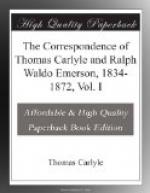Two days after Emerson’s visit Carlyle wrote to his mother:—
“Three little happinesses have befallen us: first, a piano-tuner, procured for five shillings and sixpence, has been here, entirely reforming the piano, so that I can hear a little music now, which does me no little good. Secondly, Major Irving, of Gribton, who used at this season of the year to live and shoot at Craigenvey, came in one day to us, and after some clatter offered us a rent of five pounds for the right to shoot here, and even tabled the cash that moment, and would not pocket it again. Money easilier won never sat in my pocket; money for delivering us from a great nuisance, for now I will tell every gunner applicant, ‘I cannot, sir; it is let.’ Our third happiness was the arrival of a certain young unknown friend, named Emerson, from Boston, in the United States, who turned aside so far from his British, French, and Italian travels to see me here! He had an introduction from Mill, and a Frenchman (Baron d’Eichthal’s nephew) whom John knew at Rome. Of course we could do no other than welcome him; the rather as he seemed to be one of the most lovable creatures in himself we had ever looked on. He stayed till next day with us, and talked and heard talk to his heart’s content, and left us all really sad to part with him. Jane says it is the first journey since Noah’s Deluge undertaken to Craigenputtock for such a purpose. In any case, we had a cheerful day from it, and ought to be thankful.”
On the next Sunday, a week after his visit, Emerson wrote the following account of it to his friend, Mr. Alexander Ireland.
“I found him one of the most simple and frank of men, and became acquainted with him at once. We walked over several miles of hills, and talked upon all the great questions that interest us most. The comfort of meeting a man is that he speaks sincerely; that he feels himself to be so rich, that he is above the meanness of pretending to knowledge which he has not, and Carlyle does not pretend to have solved the great problems, but rather to be an observer of their solution as it goes forward in the world. I asked him at what religious development the concluding passage in his piece in the Edinburgh Review upon German literature (say five years ago), and some passages in the piece called ‘Characteristics,’ pointed. He replied that he was not competent to state even to himself,—he waited rather to see. My own feeling was that I had met with men of far less power who had got greater insight into religious truth. He is, as you might guess from his papers, the most catholic of philosophers; he forgives and loves everybody, and wishes each to struggle on in his own place and arrive at his own ends. But his respect for eminent men, or rather his scale of eminence, is about the reverse of the popular scale. Scott, Mackintosh, Jeffrey, Gibbon,—even Bacon, —are no heroes of his; stranger yet, he hardly admires Socrates, the glory of the




